"All ideas for improvement will be reviewed to ensure we continue to deliver valuable information that helps the maritime industry achieve ever safer operations."
Director's Log
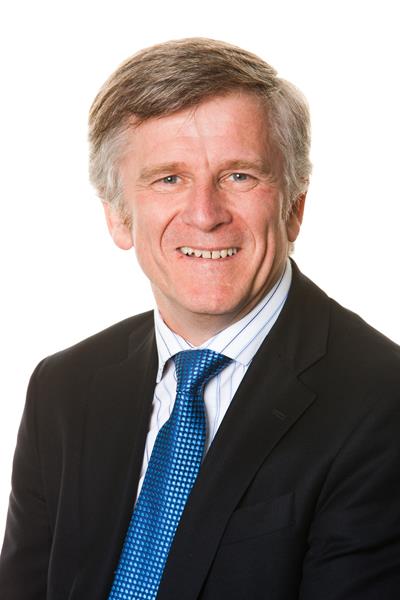
October saw the third and last Regional Marine Forum for 2017.
As happened in Dubai, we joined forces with an established maritime event so that attendees wouldn’t have to travel twice. The South and Central America forum was held in conjunction with SLOM, the South America marine terminals and monobuoy operators conference, and was attended by 90 people. I would like to thank Ricardo Izquierdo Gonzalez, President of SLOM, for their support in organising the forum.
The feedback gathered from each forum was very positive in both the information that we were presenting and the networking opportunity that the event provided. All ideas for improvement will be reviewed to ensure we continue to deliver valuable information that helps the maritime industry achieve ever safer operations. The next Regional Marine Forum will be the European forum in 2Q 2018 – more details will be released in due course.
Three OCIMF principal committees met in October. The principal committees control more than 50 sub-committees and working groups that manage the suite of OCIMF programmes and publications. Some of the key decisions made at the meetings in October concerned three of OCIMF’s flagship productions: the approval of technical content of the Mooring Equipment Guidelines, Fourth Edition, the planning for the review of the International Safety Guide for Oil Tankers and Terminals (ISGOTT) and the decision to conduct a review of the Ship Inspection Report Programme (SIRE). The activity managed by these three principal committees will be reviewed at the Executive Committee (ExCom) who meet in Singapore next week.
Stay safe,

Andrew Cassels
Director OCIMF
General Purposes Committee
The General Purposes Committee (GPC) held its 85th meeting in Singapore on 10–11 October.
The meeting was kindly hosted by Shell at their Singapore office and was attended by 21 member companies and a guest from SIGTTO GPC.
The busy agenda covered many topics including strategic issues; the SIRE programme; principal, sub-committee and work group updates; IMO and regulatory updates; security; publications and prioritisation of GPC activities. The meeting also enjoyed presentations from guest speakers representing Safehouse Habitats and the Regional Cooperation Agreement on Combating Piracy and Armed Robbery against Ships in Asia (RECAAP).
The 86th meeting of the GPC will be held in Houston, USA on 21–22 March 2018.
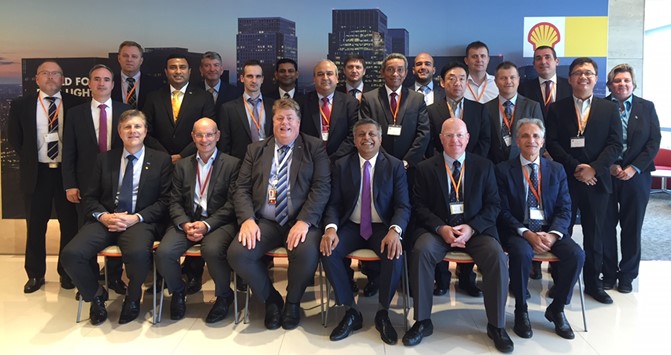
The General Purposes Committee. From left to right: Tommy Thomassen (Maersk); Vincent Roullet (Engie); Ketil Johansen (Statoil); Mark Hodgson (SIGTTO); Raj Shetty (ENOC); John Barton (Shell); Jon Evans IMT); Anton Chekmazov (Lukeoil); JH (OCIMF); Arthur Sequeira (P66); Imran Khan (Excelerate); Maxim Tokarev (Primorsk); Patrick Joseph (BP – GPC Chair); Paulo Alfonso de Cruz Silva (Petrobras); Abdes Karimi (BHP); Steve Herron (Chevron – GPC Vice Chair) Yuzuru Sato (PIMA); Toby Forrest (Reliance); Kyosti Uusitalo (Neste); Francesco Paturzo (ENI); Pierre Decarpigney (Total); Moh Nurdin Ardianto ( Medco Energi); Deb Cobb (Andeavor).
Vessel Inspection Programme Steering Group
The GPC recently set up a new working group to review the SIRE programme.
The Vessel Inspection Programme Working Group were asked to review the SIRE programme and consider whether a new, holistic vessel inspection programme could be designed that provides more value to OCIMF members.
The SIRE programme was introduced in 1993 and the only major changes since then have been the introduction of the inspector accreditation programme in 2000 and the expansion in scope to include barges in 2005. The industry has evolved considerably since 1993 and new challenges, issues and risks have emerged. For example, today there is much better recognition of how human factors contribute to incidents and maritime risk.
The working group presented a draft Terms of Reference for the project at GPC 85, where it was approved in principle. The working group has now become the Vessel Inspection Programme Steering Group and will set up expert work streams to consider the various aspects involved with vessel inspections.
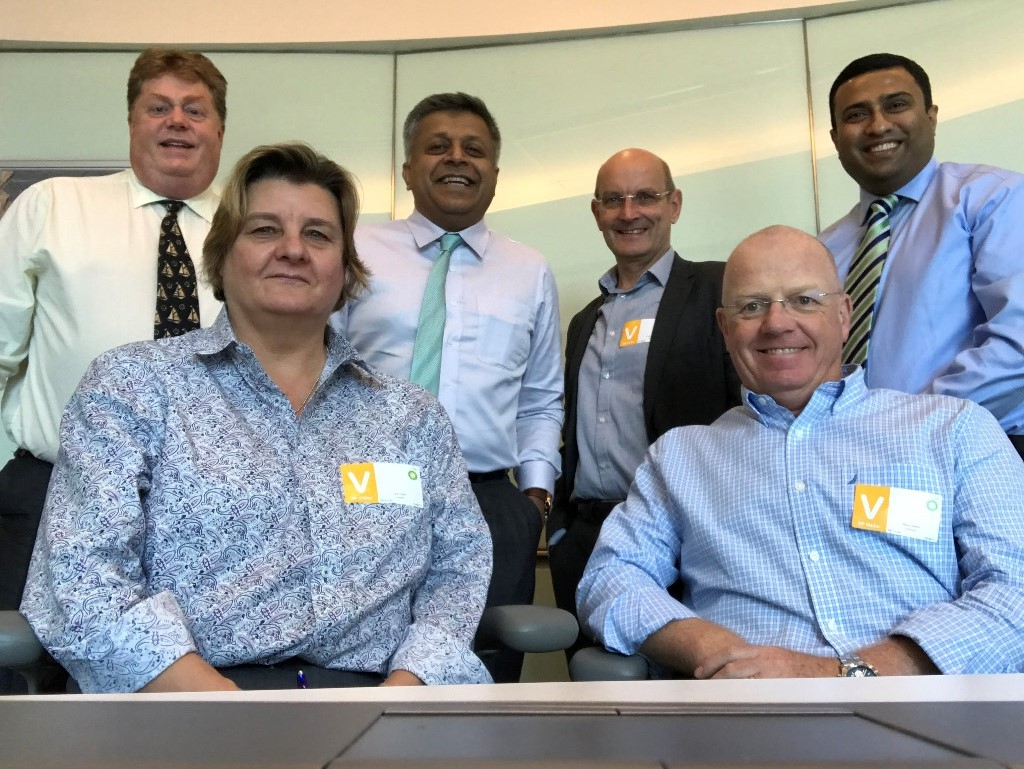
The Vessel Inspection Programme Steering Group. From left to right: Jeremy Hudson (OCIMF); Deb Cobb (Andeavor); Patrick Joseph (BP); John Barton (Shell); Steve Herron (Chevron) and Raj Shetty (ENOC).
Ports and Terminals Committee
The Ports and Terminals Committee (PTC) held their 87th meeting on 18–19 October in London, UK.
The meeting was hosted by OCIMF and followed a one-day meeting of the Mooring Equipment Guidelines Steering Group. The MEG review was a key topic in the PTC agenda and the technical content was approved to allow the document to progress into the publications review stage. The planning of the next big publication review and update (ISGOTT) was discussed. The target is to start work with the co-authors the International Chamber of Shipping (ICS) and the International Association of Ports and Harbors (IAPH) in January or February. The PTC also reviewed current and future work commitments and prioritised the plan for the next six months.
The next PTC meeting is scheduled for 18–19 April and will be hosted by Phillips 66 in Singapore.
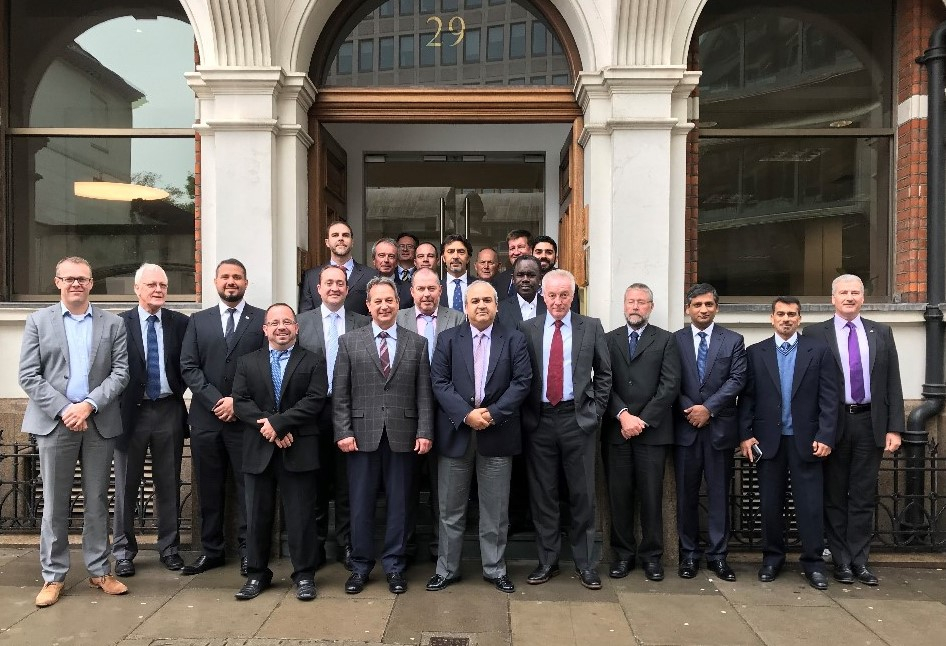
The Ports and Terminals Committee. Back row, left to right: Luciano Maldonado (Transpetro); Patrick Vantenat (Total); Frank Jan Thijssen (Vopak); Eric Vincent (Hess); Salvatore Bianca (ENI), Kevan McGregor (Shell); Tony Wynne (OCIMF); Fabiano Diaz (OCIMF). Front row, left to right: Arjan Maijenburg (Shell); Charles Stuart (NuStar); Ahmed Salem Al Shawi (ENOC); Jeff Bayham (ExxonMobil); Dominic McKnight Hardy (MIS); Mike Sitts (Chevron); Andy Glass (BP); Imran Khan (Excelerate); Bill Asante (ExxonMobil); Glenn Harman (Valero); Peter Wright (Woodside); Cherian Oommen (SIGTTO); N. Abdul Kareem (ENOC); Rob Drysdale (OCIMF).
Mooring Equipment Guidelines Steering Group
The Mooring Equipment Guidelines Steering Group held their fourth meeting on 17 October at the OCIMF office in London, UK.
The meeting took place just before the PTC meeting. The MEG review and update process has resulted in a major rewrite of MEG3 and the timeline has been challenging. The steering group reviewed the process and considered the changes made to chapters after the recent PTC and GPC technical reviews. It was agreed to recommend that PTC approve the technical content of MEG4 so that the publications (editorial, Director’s and Legal) reviews can begin.
With publication targeted for 1Q 2018, this is likely to be the last meeting of the steering group.
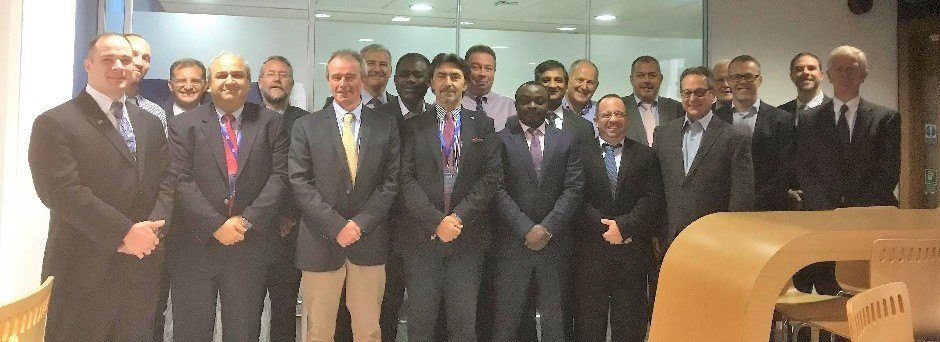
The Mooring Equipment Guidelines Steering Group. From left to right: Eric Vincent (Hess); Kris Volpenhein (Cordage Institute); S. Treccosti (ENI); Imran Khan (Excelerate); Peter Wright (Woodside); Patrick Vantenat (Total); Rob Drysdale (OCIMF); Bill Asante (ExxonMobil); Salvatore Bianca (ENI); Iain Chadwick (representing Chevron); Stephen Gwanzuwang (NLNG); Cherian Oommen (SIGTTO); Kevan McGregor (Shell); Jeff Bayham (ExxonMobil); Andy Glass (BP); Mike Sitts (Chevron); Charles Stuart (NuStar); Arjan Maijenburg (Shell); Luciano Maldonado (Transpetro); Andy Dogherty (MSML – Chair).
Offshore Marine Committee
The 15th meeting of the Offshore Marine Committee (OMC) took place on 4–5 October at the Exxon offices in Houston, USA.
The OMC discussed progress with ongoing work in each of its sub-committees, including the Offshore Vessel Inspection Database (OVID) Focus Group and Floating Systems Group. Work reviewed included the OVID composite guidelines, the revision of the Offshore Vessel Inspection Questionnaire (OVIQ3) and Mobile Offshore Drilling Unit (MODU2) questions, and the following publications:
- The Offshore Vessel Management and Self Assessment (OVMSA).
- Carriage of Methanol on Offshore Support Vessels.
- Cargo Securing Onboard Offshore Support Vessels.
- Cargo Guidelines for F(P)SOs.
- Guidelines for Offshore Tanker Operations.
- F(P)SO Marine Assessment Criteria and Questionnaire.
South and Central America Regional Marine Forum
OCIMF held its third Regional Marine Forum on 6 October in Cartagena, Colombia.
Thanks go to the Sociedad Latinoamericana de Operadores de Terminales Maritimo Petroleros y Monoboyas (SLOM), for allowing us to link our first South and Central America Regional Marine Forum to their annual conference (see below).
The forum was a great success, with over 90 attendees including OCIMF regional members and non-OCIMF members. Attendees included shipping companies, port authorities, offshore services companies and terminal operators. OCIMF Director Andrew Cassels welcomed attendees at the reception on 5 October, which provided a good networking opportunity.
The forum started with an open session. OCIMF Regional Champion Gonzalo Mera Truffini (YPF) welcomed attendees. Presentations were made by Gonzalo, Patrick McGroggan, Andrew Cassels and Rob Drysdale and included:
- Introduction to OCIMF.
- Revisions to MEG.
- The recent release of the third edition of the Tanker Management and Self Assessment (TMSA3).
- Updates to OCIMF programmes.
The session was interactive, with many questions coming from the floor. Both members and non-members found the open session beneficial.
At the afternoon's member-only session lessons learned from incidents and other relevant issues in the region were discussed. Andrew Cassels gave an update on security issues that included cyber security.
Presentation slides and photos from the forum can be accessed on the OCIMF website here. If you are interested in giving a presentation at the next South and Central America Regional Marine Forum, please send us details by filling in this form. To register your interest in attending the next forum, click the button below.
SLOM conference
The Sociedad Latinoamericana de Operadores de Terminales Maritimo Petroleros y Monoboyas (SLOM) held their XIII Jornada conference in Cartagena, Columbia on 3–5 October.
The conference was attended by SLOM members, other marine industry professionals and included many OCIMF regional members as well. Rob Drysdale attended the conference and presented a history of OCIMF’s contributions to safety. The conference is the premier event covering terminals in the region and, to the best of our knowledge, there is no other organisation covering oil and gas marine terminals anywhere else in the world.
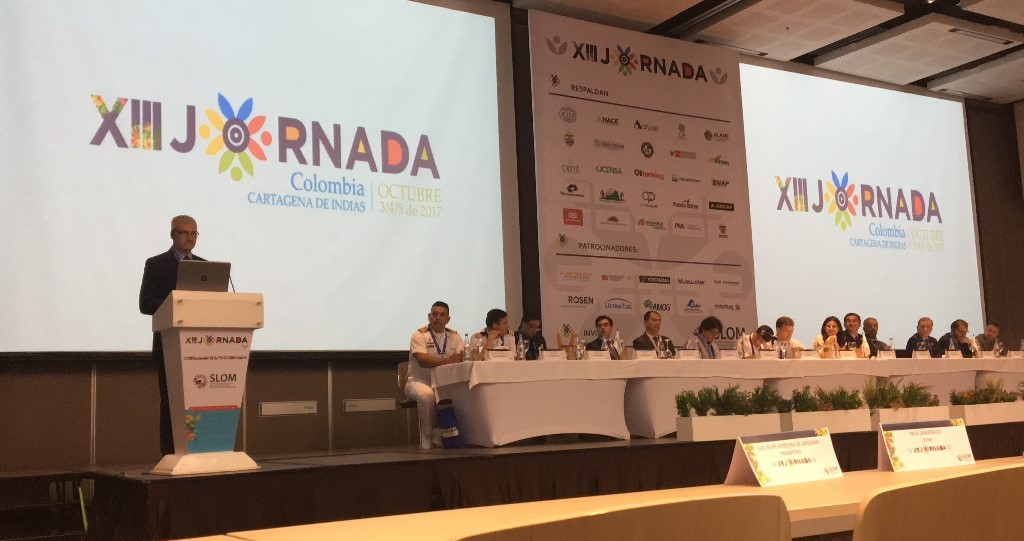
Rob Drysdale presenting at the SLOM conference.
China Focus Group
The China Focus Group met in Shanghai, China on 25 October.
The meeting was well attended with 19 people including representatives from five member companies as well as observers and guests.
A number of regional issues were discussed including the translation of OCIMF publications, increasing OCIMF’s visibility in the region and next year’s Asia Regional Marine Forum.
OCIMF would like to thank the outgoing Chairman Zhu Xiaoheng, CNOOC, for his hard work.
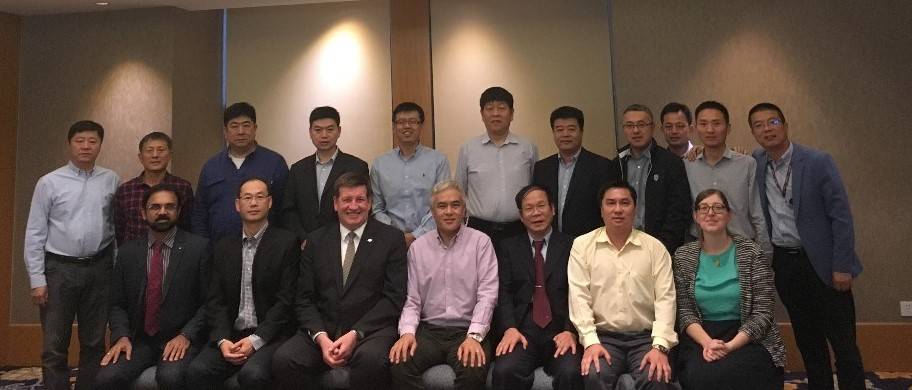
The China Focus Group. Including Zhu Xiaoheng (CNOOC), Zhao Lanxiang (CNOOC), Lu Youyu (CNOOC), Xin Yingqi (CNOOC), Jayachandran Ramanpillai (BP), Bryan Peh (IMT), Fang Yuli (CCS), Zhang Bo (Bosen Marine), Qu Shensen (Raymarine), Zheng Xiaoyang (CNOOC/SHELL), Liu Jibo (CNOOC/SHELL), Tang Hailong (CNPC), Liu Hai (SINOCHEM), Wang Xiaojun (SINOCHEM), Chen Xiaofeng (SNP), Zhao Pengwen (WANHUA), Tony Wynne (OCIMF), Kelly Hadley (OCIMF), Meng Lui (Weber Shandwick), Hellen Shen (Weber Shandwick).
China Oil Transportation Safety Forum
The China Oil Transportation Safety Forum (COTSF) was held in Shanghai on 26 October with the theme of Safety, Smart, Sharing.
More than 150 delegates attended. Tony Wynne, OCIMF’s Nautical Adviser, gave a presentation on Working Together to Promote Safe and Environmentally Responsible Operations.
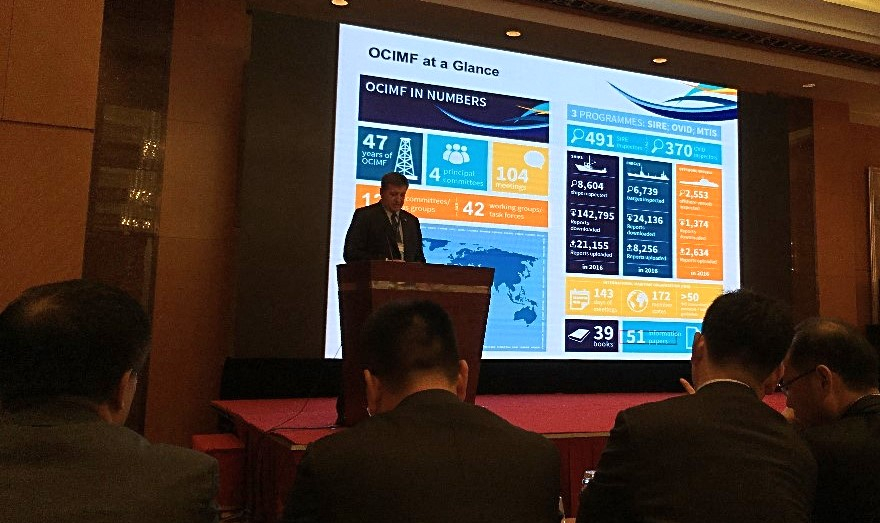
Tony Wynne presenting at the China Oil Transportation Safety Forum.
Marine Structures and Civil Engineering Focus Group
The Marine Structures and Civil Engineering Focus Group (MSCEFG) met on 16 October at the OCIMF office in London, UK.
The agenda included:
- Updates on the latest OCIMF membership engagement with the Permanent International Association of Navigation Congresses (PIANC), including phase II of the 153B working group Recommendations for the Design and Assessment of Marine Oil, Petrochemical and LNG Terminals.
- Latest work within British Standards Institution (BSI) Committee CB/502 Maritime Works, which addresses maritime works including oil and gas marine facilities and their planning and design. OCIMF has specific representation in CB/502.
- Current status on the revision of the OCIMF publications Design and Construction Specification for Marine Loading Arms and Mooring Equipment Guidelines, Fourth Edition.
The MSCEFG is a relatively new group in OCIMF but it has already helped to improve communications between operating companies and contractors, which in turn helps improve industry standards.
OCIMF would like to thank Bill Asante (ExxonMobil) for his leadership and strong support with the sub-committee as he steps down from the position of Chair. OCIMF welcomes Arjan Maijenburg (Shell) as the incoming Chair and Rabinder Manku (BP) as the new Vice Chair.
BP, ENI, ExxonMobil, Phillips 66, Shell and Total are the current members of this sub-committee. Additional membership is welcomed to the sub-committee from OCIMF member companies. Please contact Joe Megeed if you are interested in joining.
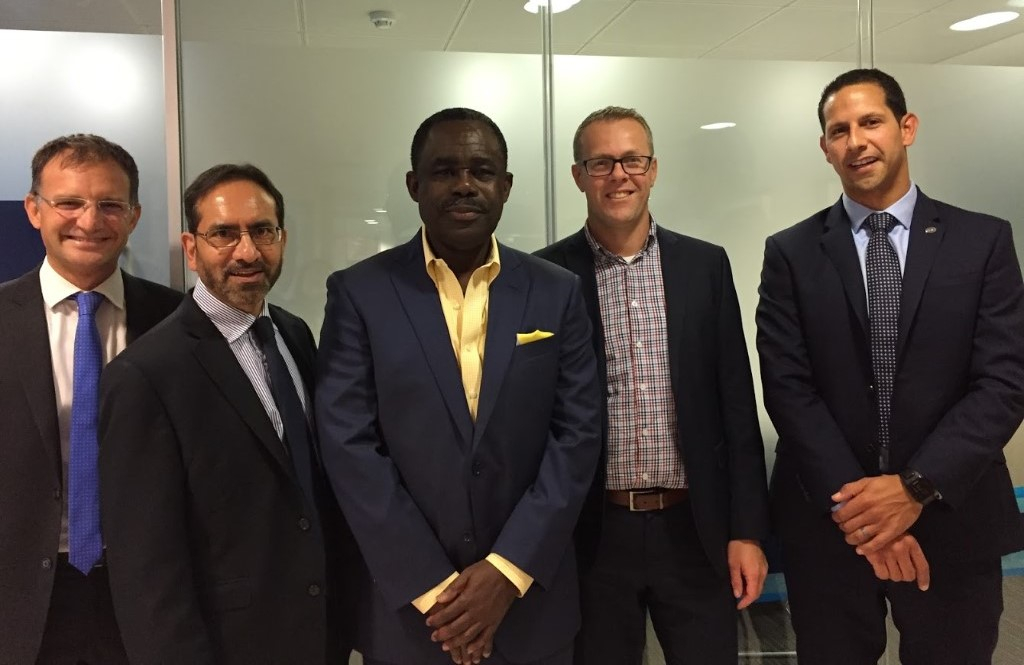
The Marine Structures and Civil Engineering Focus Group. From left to right: Stefano Treccosti (ENI); Rabinder Manku (BP); Bill Asante – Chair (ExxonMobil); Arjan Maijenburg – Vice Chair (Shell); Joe Megeed (OCIMF). Not pictured: Jeff Bayham (ExxonMobil); David Jones (Phillips 66); Eric Berger (Total).
News from the IMO
The fourth session of the Implementation of IMO Instruments (III) Sub-committee was held at the IMO headquarters in London from 25–29 September.
The meeting was well-attended with over 70 papers discussed. The main points of interest were dedicated to Port State Control activities, incident analysis and lessons learned, and issues relating to the implementation of IMO instruments.
Points of particular interest to OCIMF members included the following.
ECDIS software upgrades
The sub-committee recognised the issues with Electronic Chart Display and Information System (ECDIS) software updates, e.g. that late updates from some manufacturers meant ship operators were unable to comply. Various solutions were discussed, but as the issues are expected to resolve themselves by year end the sub-committee decided to recommend that Port State Control take a pragmatic approach until the end of 2017.
In Water Survey (IWS) rudder clearances
OCIMF challenged the requirement to put divers in the water to take rudder clearances, as this puts their safety at risk unnecessarily. Many NGOs supported this challenge. The sub-committee agreed to consider more flexibility around the requirement and will ask for the matter to be further discussed at the fifth session of the Ship Design and Construction Sub-committee (SDC 5).
Lessons learned process
There was discussion about enhancing Global Integrated Shipping Information System (GISIS) by adding data from commercial databases. Concerns were raised about using data without verification, which was already seen as a problem with global vetting companies. The concerns were largely with vetting in the dry bulk sector and not the oil sector, but the decision to stop automatic feed of data to vetting systems in the Paris MOU will impact on OCIMF members as well.
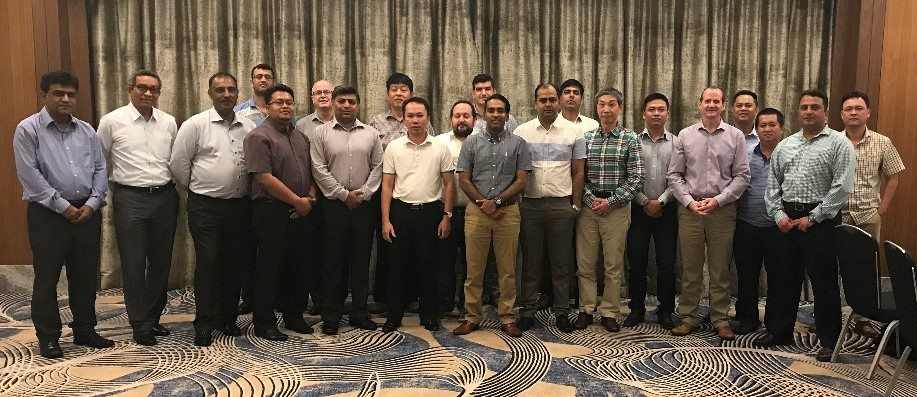
Two new inspector courses were held in October: a SIRE new inspector course (19 attendees, pictured) in Singapore and an OVID new inspector course (19 attendees) at the OCIMF office in London, UK, which was followed by an OVID refresher course (10 attendees).
SIRE programme updates
European Barge Particulars Questionnaire
The fifth edition of the European Barge Particulars Questionnaire (BPQ5 Europe/Template 2028) is now available for use. The latest release allows barge operators to import data from the European Barge Inspection Scheme, edition 7 (EBIS 7) into the BPQ5 Europe template.
End date of the Tanker Management and Self Assessment, Second Edition (TMSA2)
Vessel operators will be unable to create or publish a TMSA2 document from 2 January 2018, when TMSA2 will be officially withdrawn. This ends the handover period to TMSA3, which has been available to technical vessel operators since 10 April 2017. For more information about how TMSA3 has been incorporated into SIRE and changes between TMSA2 and TMSA3, see our website.
For any assistance or enquiries, please contact the OCIMF Programmes Support Helpdesk at
